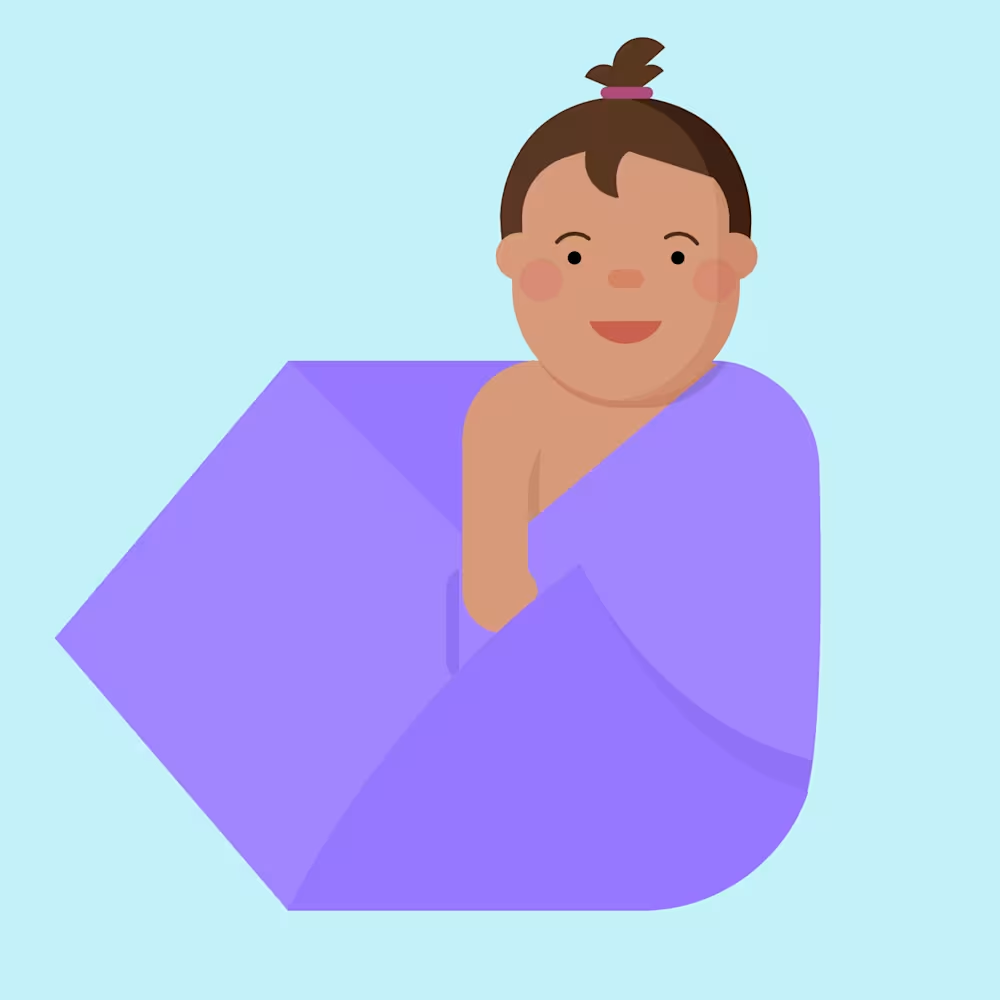When do babies start sleeping through the night?
Updated Oct 16, 2025

Having a new baby at home is wonderful! However, it’s no secret that the newborn phase is also exhausting. After a while, you can’t help but wonder about at what age babies sleep through the night and you can also get back to a more normal sleep schedule too. In this article, we’ll give you the lowdown on infants and sleeping through the night, provide tips for how to get a baby to sleep through the night, and let you know when to seek help from the pros.
What does it mean to sleep through the night?
What counts as "sleeping through the night" for babies? This typically means a child has slept for at least 6 uninterrupted hours without calling out. Note it doesn’t usually mean 10 hours of nighttime sleep without a kiddo waking up at all. All babies briefly wake during the night between sleep cycles somewhere around 4 - 6 times []. Adults wake overnight [] in this way too!
Frequent waking that requires caregiver involvement is common and developmentally appropriate [] for infant sleep, especially in newborns and younger babies who may wake up due to hunger, discomfort, or developmental changes. Once a baby no longer requires overnight feedings, some babies will be able to wake briefly and go back to sleep independently (what we’ll call “sleep through the night”) while others will signal for help from their caregivers before doing so. Factors like self-soothing abilities, feeding patterns, and a child’s sleep environment will influence when your baby sleeps through the night.
When can babies start sleeping through the night?
Newborns are expected to wake up to eat multiple times at night until they establish a pattern of consistent weight gain, are back to their birth weight, and have been cleared by a doctor or lactation consultant. Until then, aim to wake your baby to feed every 4 hours if they haven’t woken already.
Once a baby is around 6 months and no longer requires nighttime feedings [], they may be physiologically able to sleep for longer stretches at night. Many babies at this age are capable of sleeping through the night (meaning sleeping for at least 6 uninterrupted hours without calling out for help from a caregiver). However, all babies are different and reach sleep milestones at different times. Around 25 - 50% of babies [] continue to wake overnight at 6 months.
If your baby isn’t sleeping through the night at 6 months old, that’s OK too! There’s a wide range of normal when it comes to children and sleep — and plenty of ways for you as a caregiver to help your child become an if you wish. And even if your baby is already sleeping through the night regularly, they may go through sudden periods of interrupted sleep (also known as sleep regressions) while experiencing developmental changes, illnesses, teething, etc. Baby sleep isn’t always linear and we’re too!
Reasons baby may not sleep through the night
Newborns (0 - 2 months)
Hunger
If it seems like your newborn’s not sleeping, it’s for good reason! Newborns and young babies are expected to wake up multiple times overnight. They should receive 8 - 12 feedings [] in a 24-hour period, which looks like eating about every 2 - 3 hours during the day and every 4 hours overnight. You’ll aim to wake your little one to feed every 4 hours overnight until they establish a pattern of consistent weight gain, are back to their birth weight, and have been cleared by a doctor or lactation consultant.
Day-night confusion
Newborn babies tend to mix up their days and nights, which means they may want to party at night when everyone else wants to sleep! This should resolve in the of your baby’s life. However, if your newborn won’t sleep at night after a few weeks, you can help your little one better align their internal clock with yours by doing things like keeping it bright and not limiting normal background noise during the day. On the other hand, try to keep nighttime activities calm, dark, and quiet [] to help your baby differentiate between day and night.
Discomfort
Babies with reflux often have trouble sleeping on a flat surface, which can be especially true if they fall asleep while feeding. Little ones with reflux tend to have better sleep quality if they are held upright after a feeding for and any trapped air is burped out. If you think your baby has reflux and it’s preventing them from sleeping, consult with their healthcare provider.
Unpredictability is common
Unpredictability is the name of the game when it comes to newborn sleep in general. Irregular sleep patterns are normal and in those first few months of life and growth. While exhausting, keep in mind this phase is temporary. With time, daytime routines, and a solid foundation, baby sleep duration and sleep consistency should get better.
Infants (3 months - 1 year)
Sleep regressions
You’ve probably heard the term “sleep regression” and shuddered at the thought. are a sudden and significant decline in sleep and they can indicate a variety of things like neurodevelopment maturation (the), milestone mastery, discomfort from teething or illness, changes in routine, the need for a schedule adjustment, and sleep-onset associations. While there’s no reliable scientific research [] to indicate that all babies go through sleep regressions, we tend to see patterns within particular age ranges that usually negatively impact sleep for many children.
While frustrating, sleep regressions are usually temporary. You can help your child get back on track by keeping sleep schedules consistent and reinforcing independent sleep skills.
Sleep associations
In general, if a child receives parental help (like using a pacifier or being rocked to sleep) at the beginning of the night to fall asleep, it can be very difficult for them to without it. If they get help falling asleep at bedtime, chances are they will want that help in the middle of the night too. These sleep habits can lead to fragmented and shortened sleep for the entire family.
This tends to be a common reason why families consider . There are a variety of and we encourage parents to give their babies the opportunity to learn to self-soothe at bedtime if:
The parents want to
The baby is in good health
The infant has been fed, cuddled, and is dry
Baby or family isn’t getting sufficient sleep
If you’d like more personalized sleep guidance for your little one, consider submitting for a sleep plan through . Our step-by-step plans are tailored to your child’s needs as well as your family’s goals and comfort levels.
7 tips for getting baby to sleep through the night
Here are some tips to help your child sleep 6+ hours overnight:
Follow age-appropriate wake windows
Make sure baby gets sufficient nutrition throughout the day
Establish a bedtime routine early on
Set up a space conducive to sleep
Learn your baby’s sleep cues
Promote self-soothing skills
Offer lots of time and attention during wake times
Find more details below:
Tip #1: Follow age-appropriate wake windows
Following wake windows that are appropriate to your little one’s age and development can help you find your child’s optimal nap times and prevent overtiredness. often leads to more crying at bedtime, increased night wakings, and/or early waking.
refer to the amount of time a child will comfortably be able to stay awake before that homeostatic pressure helps drive a baby to sleep. They will lengthen over the course of a child’s first year of life and throughout childhood. For example, newborns can only stay awake for 30 minutes - 2 hours before needing to sleep again while 9 - 12 month olds usually can stay awake between 2.5 - 3.5 hours. Wake windows tend to get longer throughout the day, with the shortest wake window before the baby’s first nap and the longest stretch of awake time right before bedtime.
If you’d like help finding optimal sleep times for your little one, consider sleep predictor. This tool can help you take the guesswork out of wake windows, especially if your child is in the midst of a nap transition or is having trouble falling asleep at bedtime.
Tip #2: Make sure baby gets sufficient nutrition throughout the day
It’s expected that newborns and young babies will wake overnight to feed. Once your baby has been cleared by their medical provider or lactation consultant to go longer stretches overnight without eating, making sure they’ve received sufficient nutrition throughout the day can help eliminate night wakes due to hunger.
Note that it’s common for to wake up 1 - 2 times per night to feed. Around , many babies can sleep for long stretches at night, especially if they’ve developed strong self-soothing skills and are eating enough calories throughout the day.
Tip #3: Establish a bedtime routine early on
By around , babies can benefit from pre-sleep routines that can help cue it’s time to sleep. Choosing a couple of activities — like feeding, stories or lullabies, and a diaper change — and doing them in the same order every day before bed can make the transition to sleep easier.
You can also set the tone for sleep by keeping your voice low [] and soothing to limit stimulation before bedtime.
Tip #4: Set up a space conducive to sleep
Your baby’s sleep environment [] matters! Babies sleep best in a room that is cool, dark, and quiet. may help your little one fall asleep faster and stay asleep longer. There are lots of white noise machines marketed to help sleep as well as apps and YouTube channels dedicated to it. The American Academy of Pediatrics [] recommends that if you use white noise in your child’s sleep space, ensure the machine (or source of noise) is at least 7 feet (200 centimeters) away from the baby and the volume is lower than the maximum setting, generally no louder than 50 decibels.
Tip #5: Learn your baby’s sleep cues
It’s also important to try to understand your baby's habits and . Some babies show lots of signs that they’re ready for sleep (like yawning, fussiness, irritability, eye rubbing) while others may only show a few, no cues, or they may be fleeting!
As a parent, you’re observing and responding to your baby’s cues. You’ll likely find this is a work in progress, but it does get easier. Even then, you may not get it right every time and that’s perfectly normal! However, paying attention to your kiddo’s signals that they’re ready for sleep can help prevent overtiredness, which can lead to a child having a harder time falling asleep and staying asleep. Note that older babies (10 - 11 months) often mask their sleepy cues, so it’s best not to solely rely on them at this age.
Tip #6: Promote self-soothing skills
Around 3 months old, you may be able to start implementing thewith your baby as a way to promote self-soothing skills at this age. This means placing your baby in the crib while they’re drowsy but still awake. If they begin to fuss, wait a small amount of time, then pick them up and console them. After a few minutes, place them back in their crib while still awake. You can repeat the process until they fall asleep in the crib.
Gradually over time you would increase the amount of time you pause and reduce the pick-up console time to reinforce independent sleep skills. This practice can help your little one learn to fall back to sleep [] on their own when they naturally awaken during the night.
Tip #7: Offer lots of time and attention during wake times
Babies need to feel calm and secure [], especially early on. Hold your child and pay attention to their signals (for sleep and comfort) as much as possible. Bonding with your baby [] — and having them bond with other caregivers too! — builds trust and closeness.
This is important for toddlers too. A routine that allows time for connection and winding down for the day can help prime their bodies for sleep.
When to seek help
Seek help from a professional sleep consultant
You might consider seeking help from a professional sleep consultant if you need support with any of your child’s sleep issues, whether it’s difficulties with frequent night waking, night weaning or reducing feeds, split nights, transitioning a child to their own sleep space, nap issues or early waking, etc.
provides parents with personalized sleep plans that take into consideration your child’s needs as well as your family’s goals and comfort levels.
Seek help from a medical professional
On the other hand, it is best to consult a doctor or other medical professional for any sleep issues that may be health-related. Babies who are extremely fussy [] or often difficult to console may have a medical issue, like sleep apnea or reflux. Always be sure to contact your child’s doctor if you ever suspect they are having trouble breathing.
Takeaway
Everyone wakes during the night (adults too!), but we typically call it “sleeping through the night” when an infant is able to settle back to sleep and doesn’t signal for help from a caregiver. Once a baby is around 6 months and no longer requires nighttime feedings, they may be physiologically able to sleep for longer uninterrupted stretches at night, though some babies sleep through the night sooner.
Factors like self-soothing abilities, feeding patterns, and your baby’s sleep environment can influence getting your baby to sleep through the night. Often a parent-led sleep association (like rocking, using a pacifier, etc.) makes it difficult for babies to fall back to sleep independently. These sleep habits can lead to fragmented and shortened sleep for the entire family.
To promote better sleep, it can be helpful to follow age-appropriate wake windows, ensure your child is getting sufficient nutrition during the day, have an established bedtime routine, and have a space that is conducive to sleep.
Parents often consider sleep training to teach their child to self-soothe overnight. You can also submit for a personalized sleep plan through for step-by-step sleep assistance for your baby that fits your goals and comfort levels.
Share article:
Note: The content on this site is for informational purposes only and should not replace medical advice from your doctor, pediatrician, or medical professional. If you have questions or concerns, you should contact a medical professional.
10 Sources
Share article:













